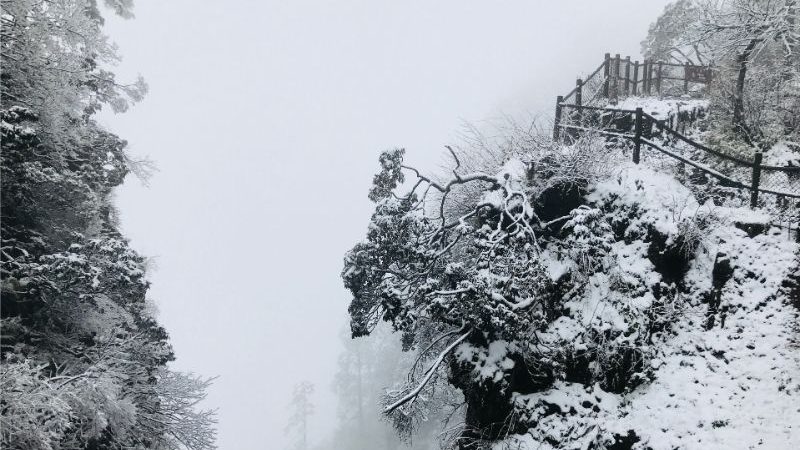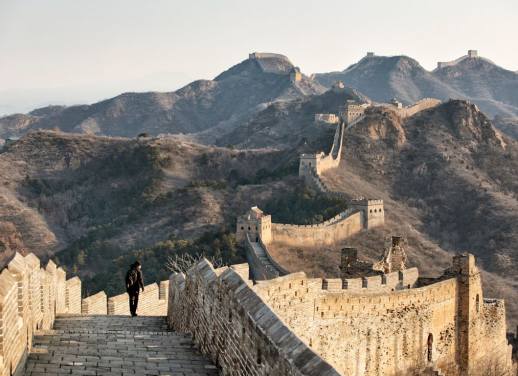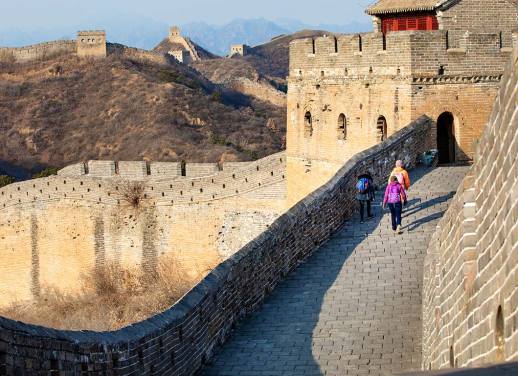Winter is not peak tourism season in China. Which is exactly why you should visit when the temperature drops.
Picture this: instead of battling the throngs and the heat at the Great Wall, you can catch it dusted in snow, mixing with holidaying locals instead of Instagram-obsessed tourists.
There are many reasons to brave the cold and see China in winter, but let’s start with the best.
Magical festivals
There are lots of things that China does well, but festivals are near the top of the list. In winter, set against a backdrop of darkness and snow, Chinese festivals become even more magical.
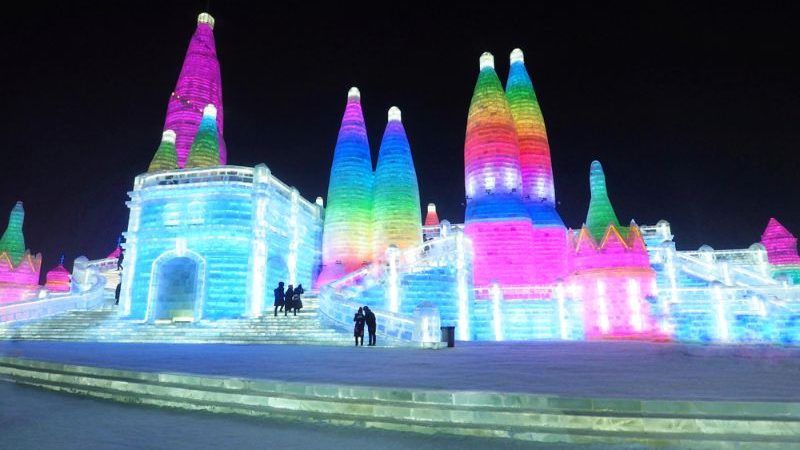
The Harbin Ice Festival at night. Photo by Sunwand24, Shutterstock.
The Harbin International Ice & Snow Festival is absolutely unmissable if you’re in northeastern China. Not only will you see the biggest and most spectacular ice sculptures in the world, you’ll also get a quintessential Chinese experience of an overnight train ride from Beijing to get there. With its remote location and history shaped by both Chinese and Russian dynasties, Harbin is like nowhere else in China.
FIND OUT MORE ABOUT OUR 5-DAY SMALL GROUP ADVENTURE TO THE HARBIN ICE FESTIVAL HERE
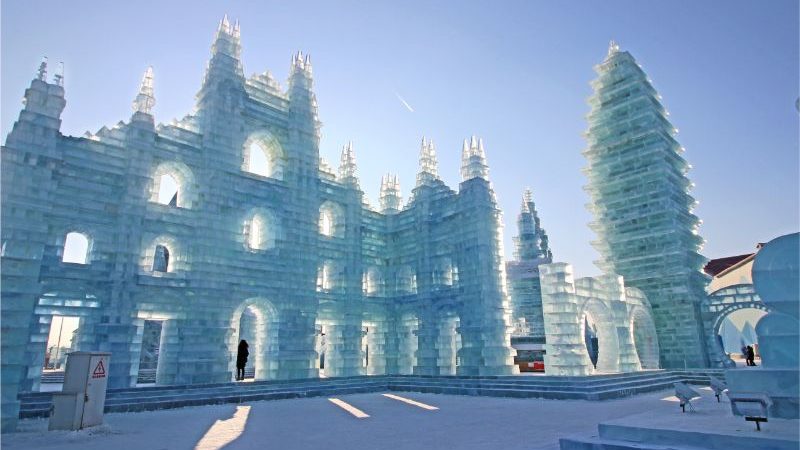
One of the incredible ice structures at Harbin. Photo by Septumia Jacobson, Unsplash.
Of course, the biggest and best festival is Chinese New Year. Here it’s a much more intricate and spiritual festival than the celebrations you’ll know from international Chinese enclaves. Delicate lanterns light up the night sky, families rigorously clean their homes before sitting down for ‘reunion’ dinners, red envelopes filled with money are given as gifts… and that’s just to start. A winter visit to China during the New Year festivities is the perfect way to see a real slice of Chinese life.
RELATED: BEST TIME TO VISIT CHINA
Exhilarating winter sports
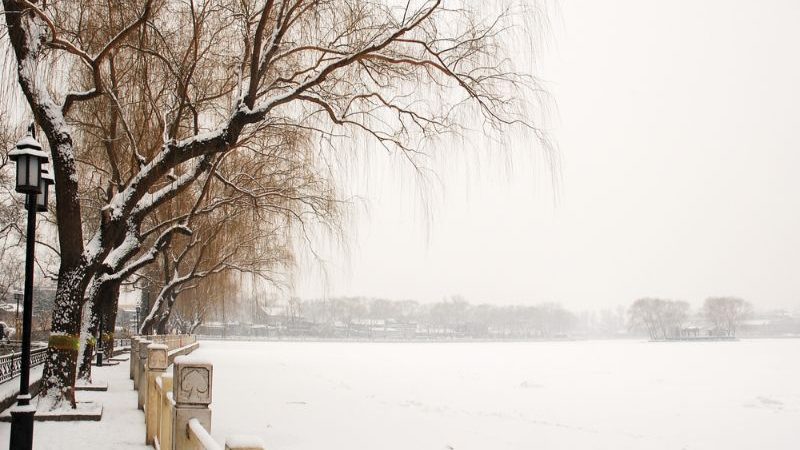
Hou Hai Lake is a popular spot for ice skaters. Photo by flymote, Shutterstock.
It may not spring to mind as a winter sports destination, but China is seriously upping its game in this area. Beijing is all set to host the 2022 Winter Olympics, Hou Hai Lake and its surrounds is a local favourite for ice-skating, and the country’s many mountains and regular snowfall makes it seriously underrated as a skiing haven.
If you’d rather just enjoy the beautiful scenery on foot, Emei Shan and Huangshan are gorgeous mountain towns covered in glittering snow during winter. There are plenty of hiking trails, and both towns are known for their hot springs. What’s better than a hot soak after a day plodding through freshly fallen snow?
RELATED: WHY EMEI SHAN NEEDS TO BE ON YOUR CHINA BUCKET LIST
Unbeatable comfort food
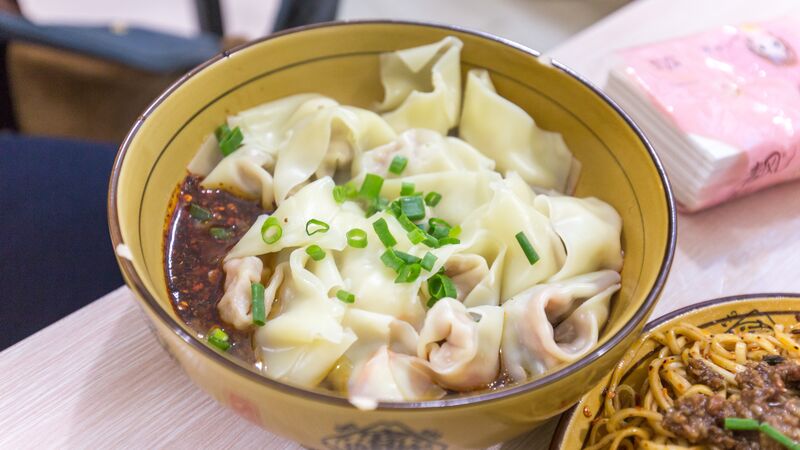
A hot bowl of goodness is never far away. Photo by Damien Raggatt.
Where to start? China’s size means there are huge variations in cuisine, depending on the region. From the fiery spices of Chengdu and Xian, to the sizzling stir-frys and bubbling broths of Shanghai, each region has one thing in common: when you’re frozen from nose to toes, super-satisfying comfort food is never hard to find.
JOIN US ON A 12-DAY REAL FOOD ADVENTURE AROUND CHINA – MORE DETAILS HERE
There are certain delicacies that you’ll find everywhere during the winter months, cooked up fresh on the streets so you can grab them and go. Look out for baked or glazed sweet potatoes, roasted chestnuts, tanghulu (sugar-covered hawthorn berries on a stick), and the local favourite – cabbage!
In Beijing, stockpiling cabbage for the winter was once necessary for survival. Big heads of cabbage covering balconies and doorsteps was totally normal, and it’s still something of a tradition for older generations. There’s not much need for it anymore, but nonetheless cabbage will be a fixture of many meals if you head to Beijing in winter.
RELATED: WHAT IT’S REALLY LIKE VISITING CHINA ON A SMALL GROUP TOUR
The practical stuff
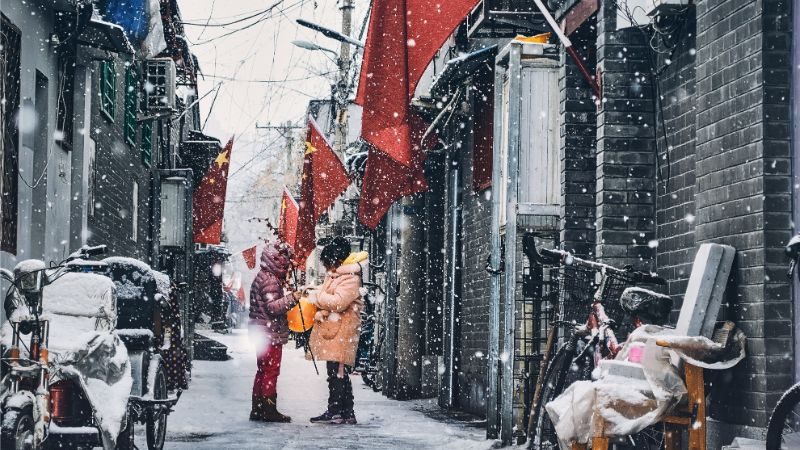
Trying to stay warm in Beijing. Photo by zhang kaiyv on Unsplash.
Northern China is much colder in winter (temperatures of -35 degrees Celsius isn’t uncommon) but it’s also much better equipped to deal with a deep freeze. Think properly heated buildings, snow cleared off urban streets, and gritted pathways to prevent slipping. Down south, winter weather is more damp and chilly than the snow-covered wonderland up north. But if you layer up, don your best waterproof jacket and fill your belly with a spicy bowl of stew, you’ll enjoy it just as much.
 Your luggage should include all the usual winter-ready clothing: thick socks, lightweight thermal layers, a waterproof and windproof jacket, and some fleece tops. In rural China, toilet facilities are basic at best and non-existent at worst, so carry anti-bacterial hand gel and a personal supply of toilet paper. Electricity may also be sparse, so a small torch and hand-wash laundry tablets will come in handy.
Your luggage should include all the usual winter-ready clothing: thick socks, lightweight thermal layers, a waterproof and windproof jacket, and some fleece tops. In rural China, toilet facilities are basic at best and non-existent at worst, so carry anti-bacterial hand gel and a personal supply of toilet paper. Electricity may also be sparse, so a small torch and hand-wash laundry tablets will come in handy.
For overnight train journeys, stock up on packs of instant noodles and make use of the boiling water that’s readily available in all stations and carriages. Invest in a season 4 sleeping bag to stay cosy during the night-time dip in temperatures, especially in guesthouses and homestays; you may like to consider bringing your own sleep sheet too.
Warming up to a winter adventure in China? Explore our range of small group adventures here.
Feature photo by Tony Yu, Unsplash.

